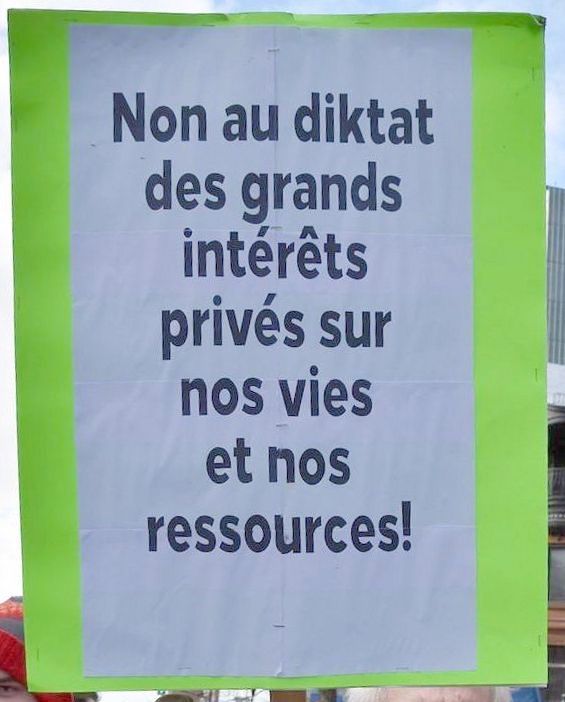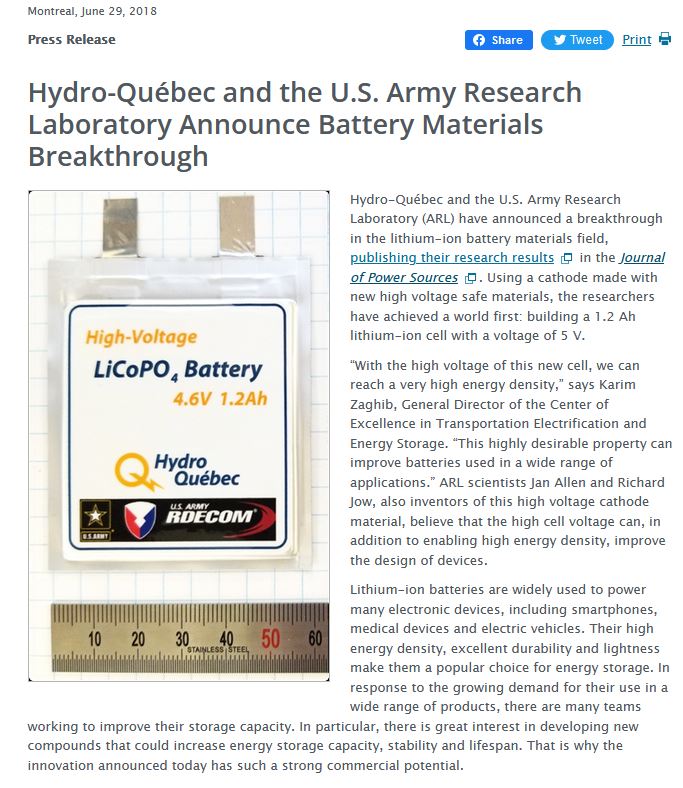December 2, 2022 - No. 52
Anti-National Agenda of Legault Government in Quebec
"Québec Flagship" -- Hydro-Québec
Loses Its Moorings
For Your Information
• Multi-Million Dollar
Partnership Between Hydro-Québec
and the U.S. Army
Anti-National Agenda of Legault Government in Quebec
"Québec Flagship" -- Hydro-Québec
Loses Its
Moorings
On the day Pierre Fitzgibbon, Minister in the Legault government responsible for the Economy, Innovation and Energy, was sworn in as a cabinet minister, he declared that in Quebec, "we consume far too much electricity, as residents." Quebeckers are entitled to ask why he says so when there is no dearth of electricity in Quebec for which, as residents, they are always made to pay more and more.
A budget advisor at the Association coopérative d'économie familiale (ACEF) du Nord de Montréal reacted to the statement in a letter published in Le Devoir. In her letter, she reminds us how energy is essential in our daily lives: to heat, eat, wash, be healthy, work and study. She questions the Legault government's plan to give priority to energy-intensive businesses.
And this precisely is where the truth of the Legault government's
agenda to green the economy can be seen. The writer appropriately
raises the issue of Hydro-Québec's change of vocation because
Quebeckers have always been told that the nationalization of private
electricity companies 60 years ago
was done in order to be "masters of our own house." This really is no
longer the case as is especially evident when it comes to electrical
energy. Hydro-Québec has lost its moorings as a result of the
pay-the-rich schemes of subsequent governments since the early nineties
when neo-liberalism set the
direction of the economy to the detriment of the people, their society
and nation-building.
In a speech given by François Legault at the swearing-in of his cabinet ministers on October 20, he announced the creation of a "Committee on the Economy and Energy Transition." The program is to further concentrate decision-making power in the hands of his cabinet where narrow private interests now rule.
These large private interests are represented at Hydro-Québec meetings by private firms such as McKinsey. Sylvain Audette, an associate member of the Chair in Energy Sector Management at the École des hautes études commerciales (HEC) in Montreal, had this to say about the presence of this powerful U.S. consulting firm in Hydro-Québec meetings: "These consultants, even if they sign a confidentiality clause, if they do a mandate for another [client], their brains are not erased." At meetings in which consultants participate, they "may have access to information that is not necessarily covered by confidentiality agreements," he explained.
To be kept in mind is that, alarmingly, it is the intelligence agencies and the U.S. war machine who are calling the shots as an integral part of these narrow private interests. Whereas all infrastructure and facilities must be modernized as a result of the developments of the technical and scientific revolution and ending the use of fossil fuels is urgent, the fundamental question remains who the economy serves. To sell out the natural and human resources of the country and put them at the disposal of the U.S. war machine in the name of "greening the economy" is cynical indeed. Quebeckers will not accept this kind of "nationalism" on the part of any government no matter what its political stripes.
Hydro-Québec's Trajectory
Beginnings
When it was created in 1944, Hydro-Québec operated only four power plants concentrated in the greater Montreal area. All the rest of Quebec was under the control of private power companies, each with its own rates. In post-war Quebec, the demand for electricity was growing at the same rate as the economy, doubling every ten years. This very rapid growth forced power companies to launch major projects at a frantic pace.
Most of the rivers near the major urban centres had already been harnessed in Quebec. What lay ahead were huge hydroelectric dam construction projects in remote areas. This required huge investments of frozen money for many years before there was a monetary return on this financing, which also had its share of risks, something that private electricity companies were not prepared to do. This is where Hydro-Québec comes in as a state-owned company that will take all these risks while the big financiers from Wall Street and elsewhere lend money to Hydro-Québec to finance such large projects while being guaranteed by the Quebec government a return on their investments.
Nationalization with
Compensation of Private Electricity Companies
In 1962, the 11 private electricity companies were nationalized by the Liberal government of Jean Lesage. They had the advantage of being spread throughout Quebec, but they were dominated by Anglo-Canadian, U.S. and British interests, which would not accept being nationalized without compensation. These eleven companies were also major donors to political parties in Quebec.
 The Lesage government called a
referendum on this
nationalization project in the fall of 1962 under the slogan
"Now or
never, masters of our own country." The argument put to
Quebeckers was
that with nationalization, everyone would be able to pay the
same
electricity rate and control the
development of this natural resource. On November 14, 1962 the
Liberals
won the election. The eleven private electricity companies were
bought
out for a sum of more than $600 million, which was a huge sum
considering that the Quebec government's revenues in 1961-1962
were
$750 million.
The Lesage government called a
referendum on this
nationalization project in the fall of 1962 under the slogan
"Now or
never, masters of our own country." The argument put to
Quebeckers was
that with nationalization, everyone would be able to pay the
same
electricity rate and control the
development of this natural resource. On November 14, 1962 the
Liberals
won the election. The eleven private electricity companies were
bought
out for a sum of more than $600 million, which was a huge sum
considering that the Quebec government's revenues in 1961-1962
were
$750 million.
On the other hand, the Lesage government never wanted to nationalize the facilities of the 30 or so industries producing electricity for their own purposes, the largest of which was Alcan, which already operated 2,000 megawatts in the Saguenay and Lac-Saint-Jean regions. Even today, the 640 workers of Rio Tinto Alcan's Énergie électrique subsidiary are responsible for the operation and maintenance of its 28 dams and six power stations, which represent the second largest hydroelectricity production site in Quebec.
1981 to 1989 --
Hydro-Quebec's Change of Mandate for Commercial Purposes
One of the major projects Hydro-Québec began in 1959 was the harnessing of the Manicouagan River on the Quebec North Shore. It was during this period that many of the engineers hired by Hydro-Québec were trained in the construction of these large hydroelectric dams, including one of the largest multiple arch dams in the world. Hydro-Québec's engineering expertise was later developed with new innovations such as the construction in the 1960s and 1970s of the world's first 735,000 volt high-voltage transmission lines.
But all this know-how began to be taken over by the big U.S. engineering firms. In 1970, the Liberal government of Robert Bourassa announced plans to build hydroelectric dams on the rivers of the James Bay basin, without the consent of the Cree First Nation, which had never ceded their immense territory. He had to deal not only with the resistance of the Indigenous peoples but also with the demands of the big Wall Street financiers who made it a condition of lending the money required by Hydro-Québec that the project manager for this gigantic project be the U.S. consulting engineering firm Bechtel.
Between 1978 and 1983, a series of legislative measures transformed the mission and structures of Hydro-Québec. The team of independent commissioners that had been in charge since 1944 was replaced by a board of directors, whose 11 members were appointed by the government. Hydro-Québec then became a commercial company subject to the government and required to generate profits. Hydro-Québec's legal status and financial structure were changed. The government became Hydro-Québec's "sole shareholder." Its productivity gains were no longer translated into lower rates, but into dividends paid to the government. In 1989, a new amendment to the Act governing Hydro-Québec reinforced this commercial vocation by explicitly giving the Crown corporation the mandate to export electricity and to carry out activities in any field related to energy.
Neo-liberalism and the
National Destruction of the 1990s
Since the early 1990s the buzzword has been "liberalization." The U.S. financial elite and others were looking for ways to break up the energy monopolies held by the states. The idea was to divide generation, transmission and distribution into three separate entities that private companies could buy up. This liberalization required the creation of new regulatory frameworks and the organization of the electricity market into trading zones.
This liberalization of energy markets initially allowed Hydro-Québec to sell its surplus electricity at a much higher price than on the domestic market. The only catch: the U.S. Federal Energy Regulatory Commission (FERC) would never allow Hydro-Québec to enter the U.S. market if the Quebec government continued to protect its domestic monopoly.
To comply with the FERC's demands, the Quebec government transformed Hydro-Québec into a holding company in 1997, bringing together three commercial companies: Hydro-Québec Distribution, Hydro-Québec Transport (known as TransÉnergie) and Hydro-Québec Production, in order to comply with the rules of the U.S. market. The creation of the Régie de l'Énergie in Quebec the year before, with its quasi-judicial powers, had been another FERC condition.
With the change in Hydro-Québec's status to that of a commercial enterprise, the electricity rates proposed by Hydro-Québec were now debated in parliamentary commission and then decided in the Premier's office. With the establishment of the Régie de l'énergie du Québec in 1996, Hydro-Québec must now defend each request for an increase and appear before the regulators. However, the government can act on the Régie through laws and decrees.
In December 2019, the Legault government passed under closure Bill 34, An Act to simplify the process of setting electricity distribution rates.
This law exempts Hydro-Québec from an annual review by the Régie de l'énergie as of 2020 in terms of justifying its requests for rate increases and its plans to sell and/or export energy. It is therefore the CAQist government that takes control of dictating electricity rates and opening the market for the sale of blocks of energy to supranational industrial concerns which operate in Quebec and also the export of energy. This is what it means to politicize narrow private interests. These interests directly usurp the decision-making power.
Hydro-Québec generation and main transmission network, as of 2008. (Click to enlarge)
For Your Information
Multi-Million Dollar Partnership Between Hydro-Québec and the U.S. Army
A recent news item in the Journal de Montréal informs that as early as 2016, Hydro-Québec and the U.S. Army Research Laboratory (ARL) were working together to develop a new model of lithium-ion rechargeable battery that would have civil as well as military applications.
On June 29, 2018, Hydro-Québec issued a press release regarding what they called "a breakthrough in the lithium-ion battery materials field" on the part of Hydro-Québec and ARL researchers. In their words, they had "achieved a world first: building a 1.2 Ah lithium-ion cell with a voltage of 5 Volts" in the form of a rechargeable battery comprised mostly of lithium, cobalt and phosphate.
The research was part of a U.S. $8 million contract between Hydro-Québec and the U.S. Army Research Laboratory that ran from February 2016 to November 2020 where the partners split the costs 50-50. Hydro-Québec's General Director of the Center of Excellence in Transportation Electrification and Energy Storage at that time, Karim Zaghib, had this to say about the breakthrough: "With the high voltage of this new cell, we can reach a very high energy density. This highly desirable property can improve batteries used in a wide range of applications."
The ARL website, under the topic "Who we are," states the following: "The U.S. Army Combat Capabilities Development Command (DEVCOM) Army Research Laboratory is strategically placed under the Army Futures Command as the Army's sole foundational research laboratory focused on cutting-edge scientific discovery, technological innovation, and transition of knowledge products that offer incredible potential to improve the Army's chances of surviving and winning any future conflicts."
And under the topic "Collaborate with us," it declares that "Groundbreaking advancements in science and technology at DEVCOM Army Research Laboratory are made possible through meaningful collaborations between Army researchers and members of the larger Science &Technology ecosystem. In order to solve the Army's toughest challenges, we welcome potential teammates in private industry, academia, and other domains around the world to reach out and explore new frontiers in Army Modernization with our highly experienced subject matter experts."
The type of research promoted by the U.S. Army, as shown by the example of this partnership between Hydro-Québec and the ARL, falls in line with what the U.S. imperialists have in mind when it comes to manufacturing weapons and military equipment that extensively use lithium-ion rechargeable batteries and other minerals critical to U.S. "national security," as part of their quest for world hegemony.
2018
Hydro-Quebec press release
|
An article entitled "Viewpoint: Offshore Battery Production Poses Problems for Military" was published in the November 2018 issue of the U.S. magazine National Defense. Its author, Marc D. Gietter, a retired industrial engineer with the Tactical Shelters Branch of the U.S. Army Communications-Electronics Command (CECOM), had this to say:
"Lithium batteries -- both rechargeable and non-rechargeable -- have become ubiquitous in almost every weapon system used by the Defense Department. Although it is a relatively small consumer of lithium battery technologies when compared to the commercial market, the importance of these technologies cannot be understated.
"Just about every piece of man-portable electronic equipment crucial to the success of U.S. warfighters on the battlefield is powered by some form of lithium battery. The reliance on them is expected to grow exponentially as the next generation of weapons -- such as new tactical ground vehicles, unmanned systems and directed energy weapons -- are designed around the high energy density and low weight of a lithium battery technology."[1]
Intentions
Behind "Green Economy"
 Asked to comment about the
partnership between Quebec's energy
Crown corporation and the U.S. army, Daniel Breton, President
and CEO
of Electric Mobility Canada, a not-for-profit organization
"dedicated
exclusively to the advancement of e-mobility" had this to say:
"The
biggest
consumer of institutional oil in the world is the U.S. military.
They
want to find a way to reduce their dependence on oil. They are
aware
that the most disruptive events in the next few decades will be
climate
change issues."
Asked to comment about the
partnership between Quebec's energy
Crown corporation and the U.S. army, Daniel Breton, President
and CEO
of Electric Mobility Canada, a not-for-profit organization
"dedicated
exclusively to the advancement of e-mobility" had this to say:
"The
biggest
consumer of institutional oil in the world is the U.S. military.
They
want to find a way to reduce their dependence on oil. They are
aware
that the most disruptive events in the next few decades will be
climate
change issues."
In other words, it is acceptable for the U.S. to keep instigating wars of aggression and occupation, financing proxy wars and coups d'état that will create even more destruction, chaos, human refugee crises, etc., as the "most disruptive events," so long as it is done within the framework of a "greener" economy.
The people of Quebec and Canada do not subscribe to such an outlook that disinforms on what the real issues are when it comes to fighting for a bright future for themselves and for all of humanity. More specifically, they reject this notion that a "green" economy means that Quebec and Canada's economies should be integrated into the U.S. war machine.
Note
1. See "Join Global Climate Strike Canadians Can Only Rely on Themselves to Sort Out Climate Crisis", Renewal Update, September 24, 2021.
(With files from Renewal Update, Hydro-Québec, ARL, National Defense and Journal de Montréal)
(To access articles individually click on the black headline.)
Website: www.cpcml.ca Email: editor@cpcml.ca






